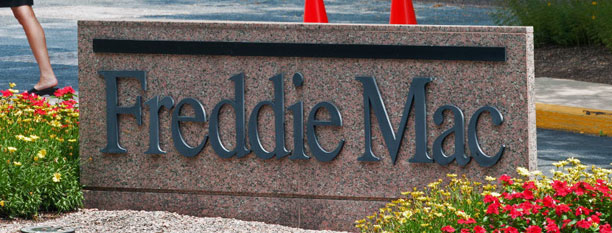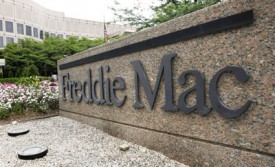Top executives at Fannie Mae and Freddie Mac were paid handsomely in the last two years, while the government agency in charge of regulating the bailed-out mortgage backers was ill-equipped to do anything about it, according to a federal review. Get the full story »
Freddie Mac
Visit our Filed page for categories. To browse by specific topic, see our Inside page. For a list of companies covered on this site, visit our Companies page.
New mortgage-backed securities rules unveiled
U.S. bank regulators on Tuesday unveiled a proposal to overhaul the market for securities backed by mortgages and other assets, a piece of the financial system battered by the recession and financial crisis. Get the full story »
Treasury to start mortgage-backed securities sales
The U.S. Treasury Department will begin selling about $10 billion a month of mortgage-backed securities as the government winds down emergency programs set up during the financial crisis.
The announcement of a fresh supply of high-quality debt coming to market surprised traders, but they said later it should be manageable. The Treasury has a $142-billion portfolio of MBS, acquired in 2008 and 2009, and estimates it will take about a year to dispose if it. Get the full story »
GOP bill would kill Fannie, Freddie
A key Republican in the House of Representatives Thursday said he would try for the third time to eliminate mortgage finance giants Fannie Mae and Freddie Mac within five years.
“We have waited for years to do something. It is time to start doing something,” Texas Rep. Jeb Hensarling, the fourth ranking House Republican, said in an interview with a small group of reporters in his office. Get the full story »
30-year mortgage rates nudge up
Mortgage rates were mostly unchanged in the latest week, with the average rate on 30-year fixed-rate mortgages edging slightly upward, according to Freddie Mac’s weekly survey of mortgage rates.
Rates had risen earlier this year, hitting their highest level since April last month. They had slumped most of last year as Treasurys had declined amid economic uncertainty. The rates generally track the yields, which move inversely to Treasury prices. Get the full story »
Mortgage rates in U.S. fall for third week
Mortgage rates eased again last week, with long-term rates continuing their decline from the current-year high set three weeks ago, according to Freddie Mac’s weekly survey.
Rates had seen a recent rise, hitting their highest level since April last month. They had slumped most of last year as Treasurys had declined amid economic uncertainty. The rates generally track the yields, which move inversely to Treasury prices.
Freddie Chief Economist Frank Nothaft cautioned, “housing demand still remains weak,” noting that new home sales in January neared the lowest levels since at least 1964, when data collection began, according to the Census Bureau. Get the full story »
Home purchase prices fall 4.3% in 4Q
The purchase price of U.S. homes fell 4.3 percent in the fourth quarter froma year earlier, as values declined across the country, according to Freddie Mac.
Frank Nothaft, Freddie Mac chief economist, said Monday that low mortgage rates and the fact that foreclosed-property and short sales remain a big part of the market, helped push “homebuyer affordability to levels not seen in decades in most places.” Get the full story »
3 years into federal bailout, costs declining
Almost three years after a series of government bailouts began, what many feared would be a deep black hole for taxpayer money isn’t looking nearly so dark.
The brighter picture is highlighted by the outlook for the bailouts’ centerpiece — the $700 billion Troubled Asset Relief Program.
“It’s turning out to cost one heck of a lot less than what we all thought at the beginning,” said Ted Kaufman, a former U.S. senator from Delaware who heads the congressionally appointed panel overseeing TARP. Get the full story »
Obama declares Fannie, Freddie model ‘dead’
The Obama administration on Friday declared the public-private housing finance model in place for the past four decades was dead but pledged to continue backing exisiting obligations of Fannie Mae and Freddie Mac.
“The GSE model is dead,” an Obama administration official told reporters as the Treasury Department released a long-awaited report on options to revamp housing reform. Get the full story »
Mortgage rates rise to 10-month high
Mortgage rates rose in the latest week, with the average rate on 30-year fixed-rate mortgages climbing to the highest level since last April, according to Freddie Mac’s weekly survey of mortgage rates.
“Long-term bond yields jumped on positive economic data reports, which placed upward pressure on mortgage rates this week,” said Freddie Chief Economist Frank Nothaft. Get the full story »
U.S. to release plan to phase out Fannie, Freddie
The White House will propose a path to wind down and eventually eliminate Fannie Mae and Freddie Mac and specify a range of options to replace the mortgage companies that have played a central role in the housing market for decades, according to people familiar with the matter.
The Obama administration is due to release its proposal for the future of the nation’s $10.6 trillion mortgage market as soon as Friday, outlining steps to gradually reduce the government footprint in the mortgage market. Together with federal agencies, Fannie and Freddie have accounted for nine of 10 new loan originations in the past year. Get the full story »
U.S. budget plan includes increase for FHA
The White House budget proposal to be unveiled next week includes an increase in borrowing costs for loans backed by the Federal Housing Administration, industry sources said Tuesday.
The move is part of a broader revamp of the U.S. housing finance system to reduce the role of the government in the mortgage market, including a gradual wind-down of government-controlled mortgage finance companies Fannie Mae and Freddie Mac.
Mortgage rates edge up to 3.81%
Mortgage rates were mostly unchanged the latest week, with the average rate on 30-year fixed-rate mortgages barely edging up, according to Freddie Mac’s weekly survey.
“Mortgage rates held relatively stable this week on news that the economy improved and inflation remained in check at the end of 2010,” said Freddie Chief Economist Frank Nothaft. Get the full story »
Mortgage rates tick up to 4.8%
The average rate on the 30-year fixed mortgage rose slightly this week, following increases in bond yields.
Freddie Mac says the average rate rose to 4.80 percent this week from 4.74 percent the previous week. It hit a 40-year low of 4.17 percent in November. Get the full story »
30-year mortgage rates dip to 4.71%
Rates on fixed mortgages dipped for the second straight week as Treasury yields fell. Freddie Mac says the average rate on the 30-year mortgage dropped to 4.71 percent this week from 4.77 percent the previous week. It hit a 40-year low of 4.17 percent in November. Get the full story »







